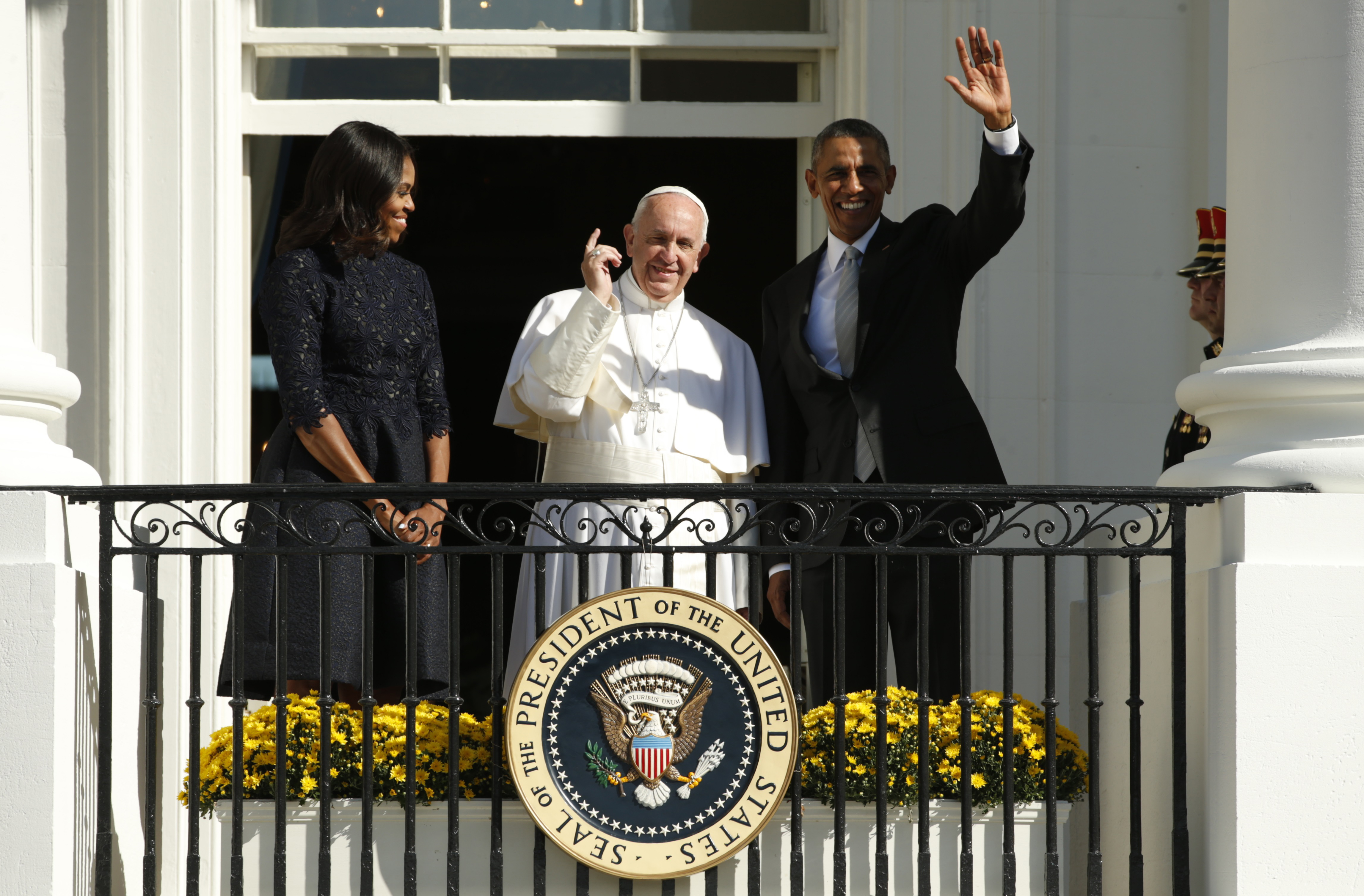This story was originally published by the Guardian and is reproduced here as part of the Climate Desk collaboration.
Pope Francis enlisted the spirit of Martin Luther King Jr. to help bolster his call for urgent action on climate change on Wednesday in a welcoming ceremony at the White House that Barack Obama said would “shake our conscience from slumber.”
Speaking in front of crowd of nearly 15,000 guests that had begun packing into the South Lawn before dawn, the pope wasted no time in striking an unashamedly political tone during his first public event of a six-day visit to the U.S.
In a surprise move, the pope made what amounted to a direct reference to Obama’s new emission regulations, which are deeply controversial among Republicans. Before a crowd of VIPs and dignitaries that included lawmakers from both parties, the pope told the president it was “encouraging that you are proposing an initiative for reducing air pollution” at a “crucial moment in history.”
Pope Francis extended the metaphor of injustice to include the need to care for “our common home.”
In words that pile moral pressure on those who oppose carbon emission regulations, the pope said: “It seems clear to me also that climate change is a problem which can no longer be left to a future generation.”
To loud applause, the pontiff said: “To use a telling phrase of the Reverend Martin Luther King, we can say that we have defaulted on a promissory note and now is the time to honor it.”
“We know by faith that the creator does not abandon us; he never forsakes his loving plan or repents of having created us. Humanity still has the ability to work together in building our common home,” he added.
The pope’s explicit reference to the Obama administration’s new proposed regulations makes the comments the most politically charged remarks since Francis began his journey to Cuba and the U.S. While in Cuba, he encouraged leaders of both countries to keep striving for reconciliation, but he steered clear of any direct references to political controversies on either side, including the trade embargo, and did not meet with political dissidents.
While his support for the new rules are not surprising, given his views on the need for environmental action, it is unusual for the pope to speak about specific government regulation or policy, just as he does not usually mention politicians by name.
The reference to the moral need to protect our “common home” echoes the pope’s second encyclical, which was published in June, and is seen by Democrats as a crucial step in helping persuade climate sceptics in Washington of the urgency of carbon reduction initiatives.
The pope, visiting the U.S. for the first time, also drew from King’s “I have a dream” speech, implying there was also a responsibility under the U.S. constitution to tackle climate change.
King originally accused the U.S. of defaulting on the “promissory note” drawn up by the founding fathers to grant all men inalienable rights, claiming African Americans had been given “a bad check.”
The pope called for action: “Such change demands on our part a serious and responsible recognition not only of the kind of world we may be leaving to our children, but also to the millions of people living under a system which has overlooked them,” he added. “Our common home has been part of this group of the excluded which cries out to heaven and which today powerfully strikes our homes, our cities, our societies.”
Obama paid tribute to the pope for “shak[ing] our conscience from slumber” in a warm welcome that made clear the personal bond between the two men.
“Holy Father, you remind us that we have a sacred obligation to protect our planet — God’s magnificent gift to us,” he said. “We support your call to all world leaders to support the communities most vulnerable to a changing climate and to come together to preserve our precious world for future generations.”
The president also thanked Francis for his diplomatic support for talks between the U.S. and Cuba.
“We are grateful for your invaluable support of our new beginning with the Cuban people, which holds out the promise of better relations between our countries, greater cooperation across our hemisphere, and a better life for the Cuban people,” said Obama.
Earlier, a ripple of whoops and cheers swept around the South Lawn as the pope’s familiar white cassock was first spotted against the cream of the White House colonnade. Despite the pomp of military brass bands and Vatican anthem, there was a relaxed atmosphere to the first public event of this highly anticipated visit.
Many of the thousands who have flocked to Washington, D.C., view this papacy as a unifying one that helps underline the role of spirituality in public life. Nonetheless, the sight of the moral leader of millions praising specific — and vexed — environmental regulations alongside Obama was likely an uncomfortable one for many Republicans who had hoped there would be a less explicit political message.
The welcoming ceremony at the White House is only a taste of what might be to come when Pope Francis addresses Congress on Thursday.



